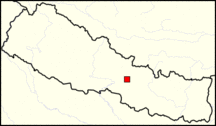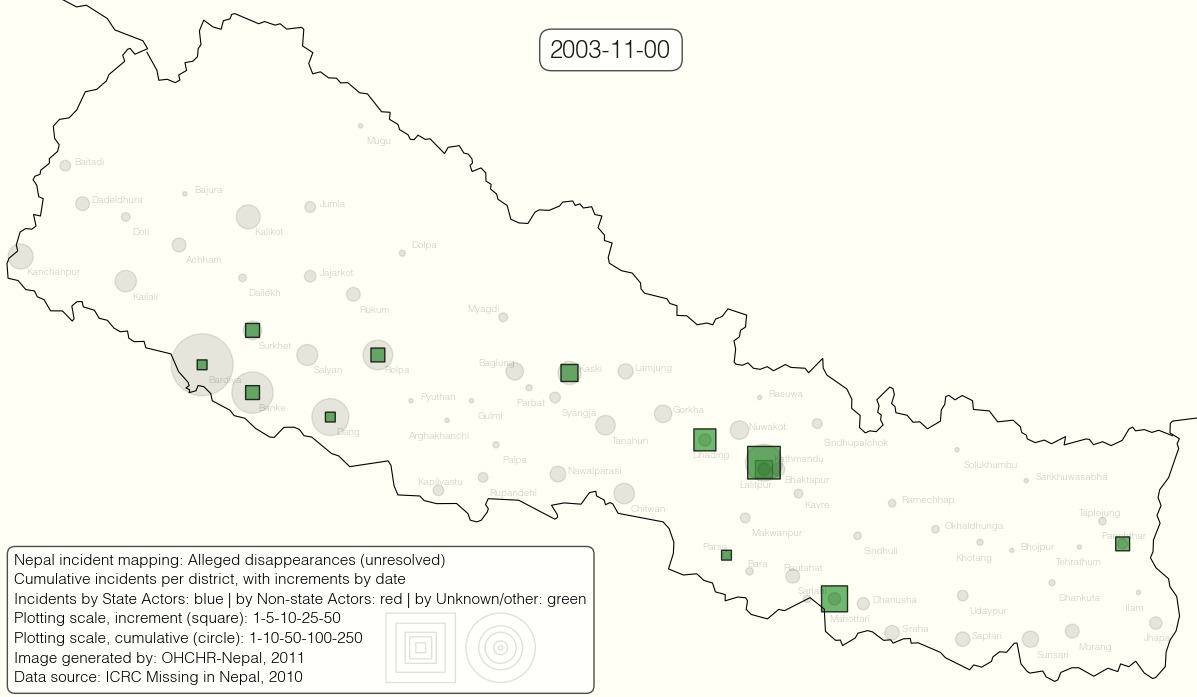2003-11-05 - incident - Dhading district २०६०-०७-१९ - घटना - धादिङ जिल्ला
Archive ref no: NCA-10700
Information regarding alleged incident | घटेको भनिएको घटनासम्बन्धी जानकारी
- Source: 2005-02-00 - report - HRW |
- श्रोत: २०६१-१०-०० - प्रतिवेदन - एचआरडुबल्यू
- 31. Baikuntha Bhujel
- On the night of October 29, 2003 (Kartik 12, 2060), a group of about ten men in civilian clothes came to the house of Ram Sharan Thapa in Jivanpur VDC-9, Dharke, Dhading district. The forty-eight-year-old Ram Sharan Thapa had previously served as the CPN-UML ward chairman.
- The men did not identify themselves, but the family believes they were army, as they were carrying different types of automatic weapons ordinarily used by the RNA.
- The armed men asked him about his cousin Baikuntha Bhujel 's whereabouts, and then took him away on foot, ordering the family to turn off the lights in the hoouse and to stay inside. Just fifteen meters from the home, the soldiers shot Thapa, and then dragged his body into a nearby field. The family found the body the next morning.32
- On November 5, 2003 (Kartik 19, 2060), Baikuntha Bhujel, a twenty-five-year-old shop owner, was attending the funeral ceremony at Ram Sharan Thapa's house in Jivanpur VDC-9. At around 1 a.m., three uniformed RNA soldiers came to the house. One of them approached Bhujel asking for his name and, after Bhujel responded, ordered him to go outside. The soldiers then took Bhujel away, locking others present at the ceremony inside the house.
- His family went to the Dhading army barracks, petitioned Army headquarters and NHRC, but has not received any information.
- Baikuntha Bhujel had been arrested before, on October 14, 2002 (Ashoj 28, 2059), and detained first in the Bahini Baireni barracks and then in the Dhading barracks, from where he was released several months later. The army requested that he should check in with the barracks every month, which he did. According to his family, he was arrested because other people reported that he was a Maoist, but the family denies he was ever politically involved.33
- On the same night of November 5, 2003 (Kartik 19, 2060), also at 1 a.m., a group of RNA soldiers arrived at the home of Hari Prasad Acharya, a forty-six-year-old poultry farmer who lived in Naubise VDC of Dhading district, just off the main Kathmandu-Pokhara road. The soldiers arrived in a white minibus and a white van,34 and some were in uniforms while others were in civilian dress. Two soldiers came inside, asked for Acharya by name, and took him away in his sleeping clothes.
- The family went to several army barracks over the next few days, but was unable to find Acharya. A relative who worked at the Chaunni army barracks in Kathmandu informed the family that Acharya was being detained there, but the relative was too low-ranking to arrange a meeting with him.
- A released detainee told the family that he had seen Baikuntha Bhujel at the Chaunni army barracks and that Bhujel had stated that he was being detained there together with Acharya.
- The family reported the case to Amnesty International, the NHRC, and the ICRC, and also wrote to the chief of staff of the RNA and the prime minister, but received no further information. The family also filed a habeas corpus petition in the Supreme Court, which remains undecided.
- Acharya was not an active member of the CPN-M, but had on several occasions provided Maoists with food and shelter. It is often dangerous for civilians to deny Maoist requests for food and shelter, so such activity cannot be seen as active, voluntary support for CPN-M. He had previously been arrested on July 25, 2002 (Shrawan 9, 2059), for providing food to Maoists, and had spent twenty-two days in RNA custody, followed by four months' imprisonment. After his release, he was required to report monthly to the police.35
Incident Reference Tools | घटनासम्बन्धी सन्दर्भ सामग्री
Legal Reference |
- Source: 2012-10-08 - report - OHCHR
Applicable International Law
- During armed conflicts of all types, a substantial body of law – with both international and domestic origins – is in operation. In terms of international law, two main systems applied during the conflict – international human rights law (IHRL) and international humanitarian law (IHL). These two systems are largely complementary and mutually reinforcing, with the shared objective of protecting life and human dignity. The primary difference between them is when they apply. IHRL provides protection during times of peace and times of war, while IHL applies only during periods of armed conflict. Both systems of law consist of treaties ratified by states parties, and of customary international law. (continue reading)
लागु अन्तर्राष्ट्रिय कानुन
- सबै प्रकारका सशस्त्र द्वन्द्वहरूमा राष्ट्रिय तथा अन्तर्राष्ट्रिय दुवै रूपमा निर्माण भएका कानुनहरूको समूह कार्यान्वयनमा रहेको हुन्छ। अन्तर्राष्ट्रिय कानुनको सन्दर्भमा, दुईवटा प्रमुख प्रणालीहरू द्वन्द्वको क्रममा लागु गरिएका हुन्छन् र ती हुन् अन्तर्राष्ट्रिय मानवअधिकार कानुन र अन्तर्राष्ट्रिय मानवीय कानुन। यी दुवै प्रणाली एक अर्काका परिपूरक तथा एक अर्कालाई मद्दत पुर्याउने खालका छन् र यिनीहरूको साझा उद्देश्य मानव मर्यादाको संरक्षण गर्नु हो। यिनीहरूबीचको प्राथमिक भिन्नता भनेको ती कतिबेला लागु हुन्छन् भन्ने हो। मानवअधिकार कानुनले शान्ति र युद्ध दुवै समयमा सुरक्षा प्रदान गर्दछ भने मानवीय कानुन सशस्त्र द्वन्द्वको बेला मात्र लागु हुन्छ। दुवै कानुनी प्रणाली पक्षराष्ट्रद्वारा अनुमोदित सन्धिहरू र प्रथाजनित अन्तर्राष्ट्रिय कानुनबाट निर्माण भएका हुन्छन्। (बाँकी पढ्नुहोस्)
- Source: 2012-10-08 - report - OHCHR
Enforced Disappearance: Governing Legal Framework
- Enforced disappearance is defined in similar terms under both IHL and IHRL. Comparing the "elements of crimes" associated with the Rome Statute with a definition of enforced disappearance taken from key texts within the human rights legal arena, the result is as follows: (continue reading)
बलपूर्वक बेपत्ता पार्ने कार्य: सम्बद्ध कानुनी खाका
- “बलपूर्वक बेपत्ता पार्ने कार्य”लाई अन्तर्राष्ट्रिय मानवीय कानुन तथा मानवअधिकार कानुनअन्तर्गत एकै किसिमले परिभाषा गरिएको छ। रोम विधानमा परिभाषा गरिएअनुसार मानवीय कानुनअन्तर्गत बलपूर्वक बेपत्ता पार्ने कार्यका तत्वहरू र मानवअधिकारको कानुनी क्षेत्रका मुख्य पाठबाट लिइएको यसको परिभाषाको तुलना यस प्रकार गरिएको छ। (बाँकी पढ्नुहोस्))
Reference Documents |
- Convention for the Protection of All Persons from Enforced DisappearanceConvention on Enforced Disappearance
- International Covenant on Civil and Political RightsICCPR
- Optional Protocol
- Supreme Court of Nepal, Habeas corpus decision, 2007-06-01Supreme Court, Habeas corpus, 2007
- Comprehensive Peace AccordCPA
- जबर्जस्ती बेपत्ता पारिनबाट सबै व्यक्तिहरूको संरक्षणसम्बन्धी अन्तर्राष्ट्रि महासन्धिजबर्जस्ती बेपत्तासम्बन्धी महासन्धि
- नागरिक तथा राजनीतिक अधिकार सम्बन्धी अन्तर्राष्ट्रिय प्रतिज्ञापत्रआईसीसीपीआर
- स्वेच्छिक प्रोटोकल
- सर्वोच्च अदालत नेपाल, वन्दीप्रत्यक्षीकरणसम्बन्धी फैसला, २०६३-०२-१८सर्वोच्च अदालत, वन्दीप्रत्यक्षीकरण, २०६३-०२-१८
- विस्तृत शान्ति सम्झौताशान्ति सम्झौता


